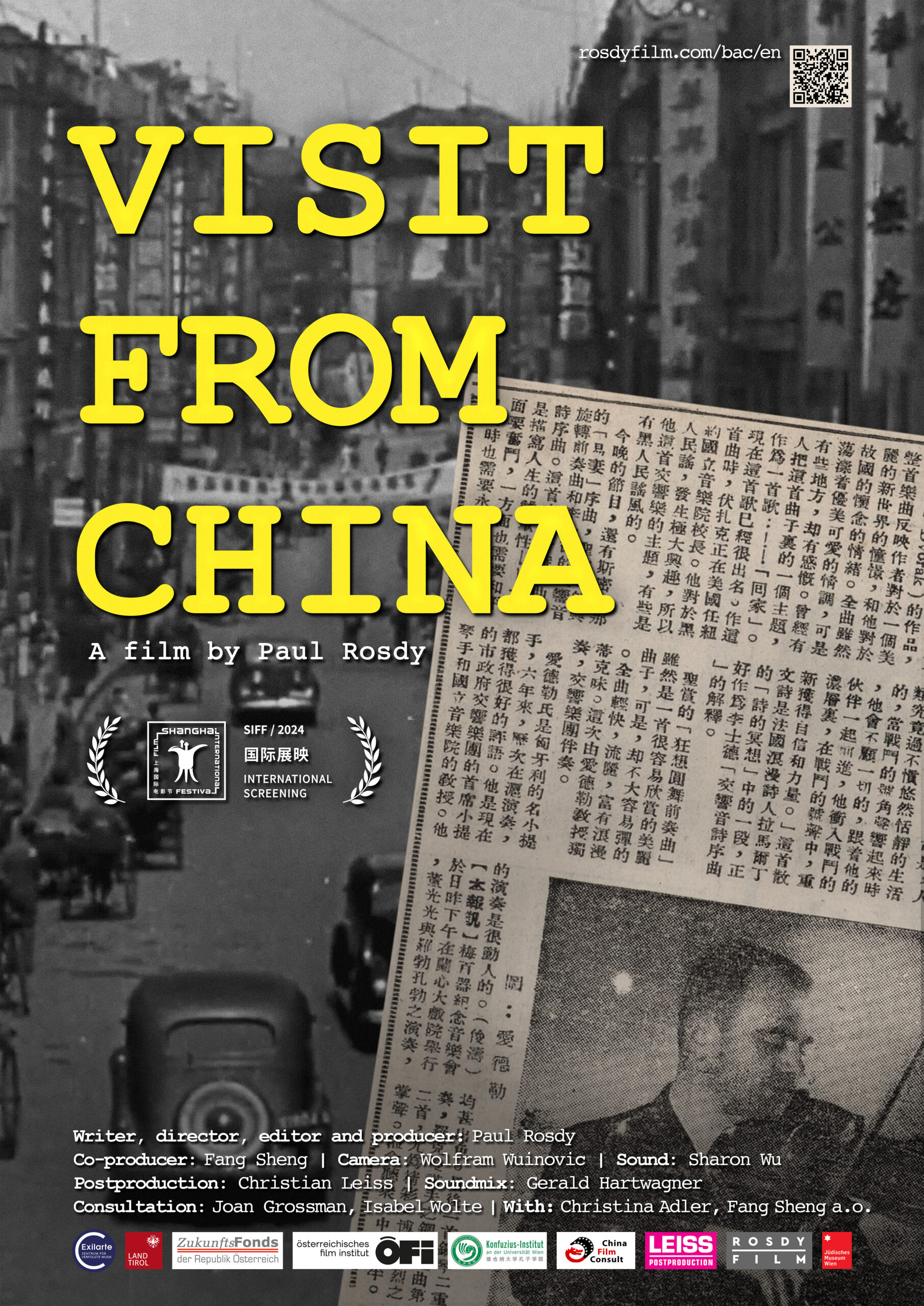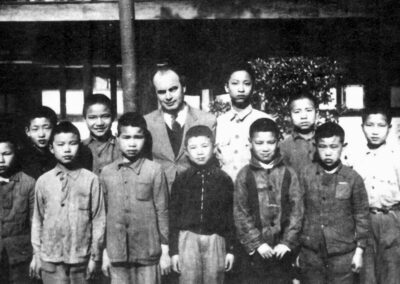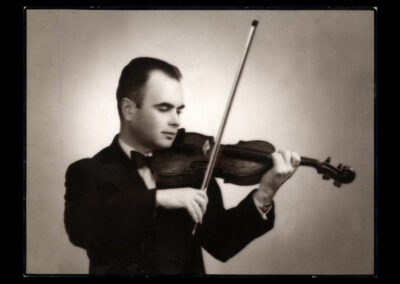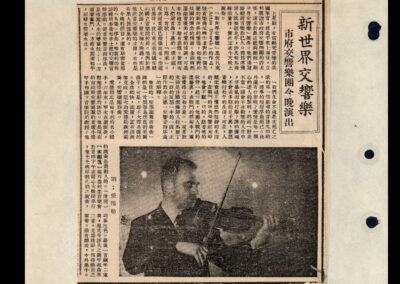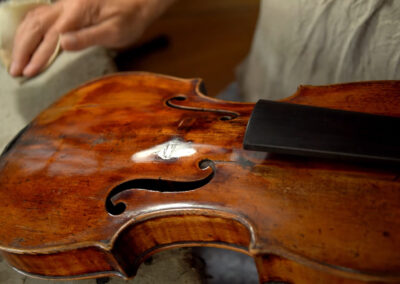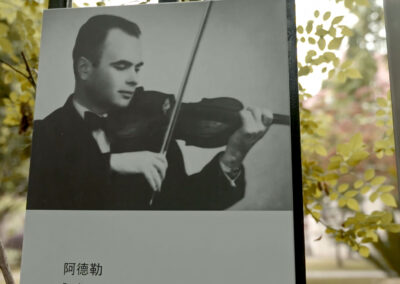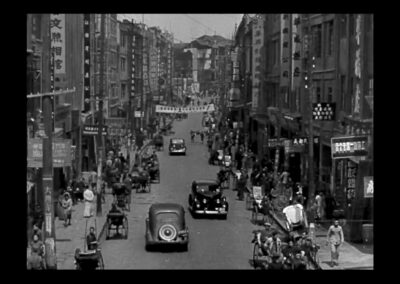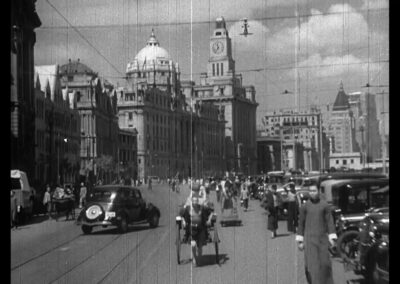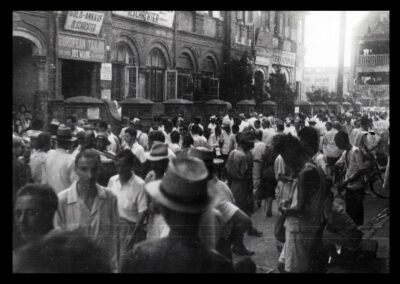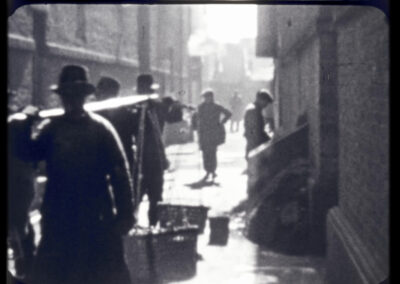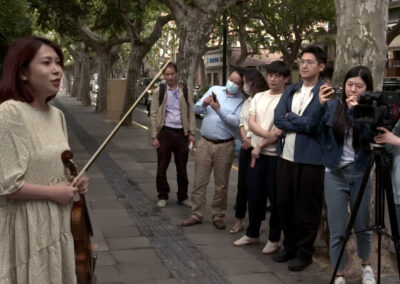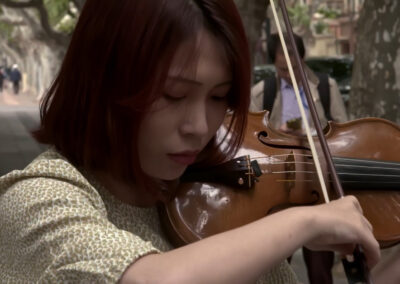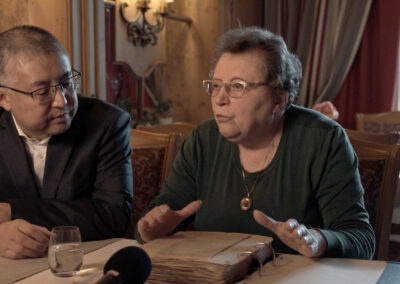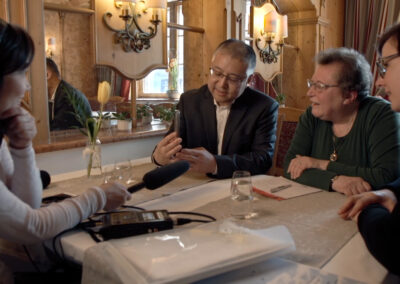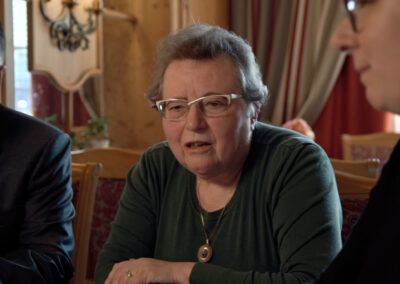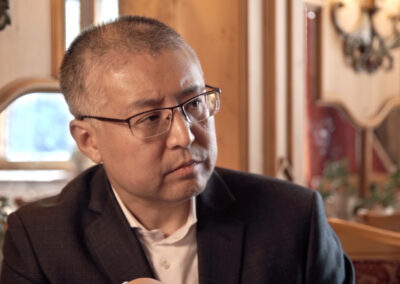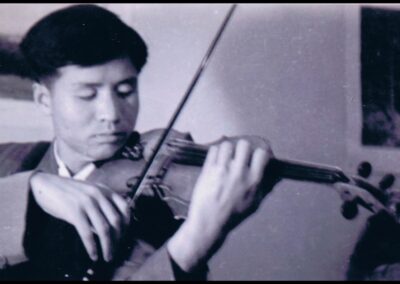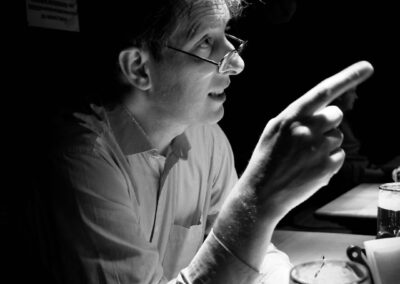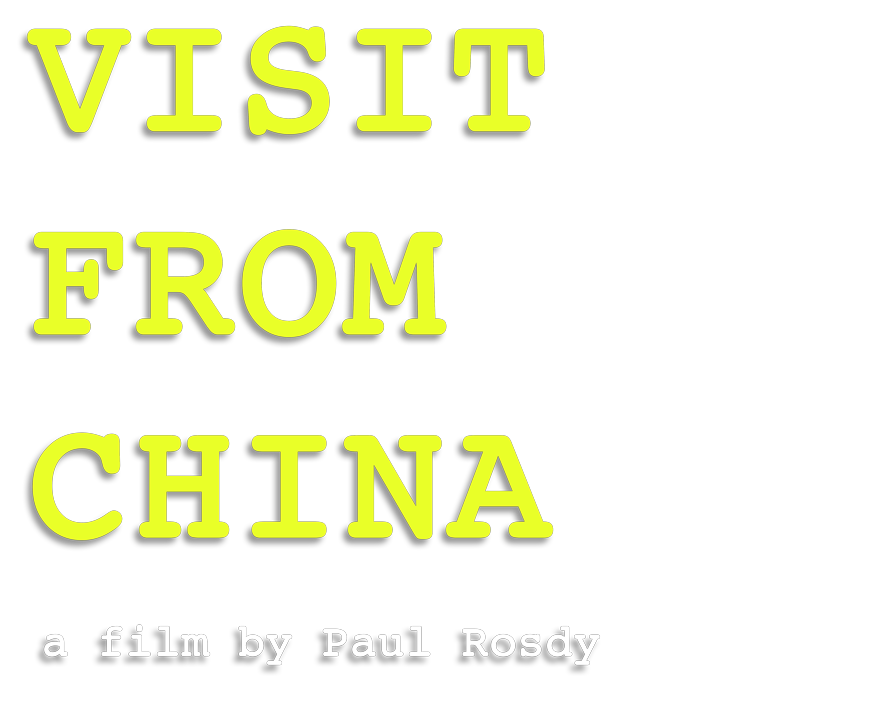
Since 8.11.2024 in movie theaters
Synopsis
VISIT FROM CHINA is a documentary film about two refugees — an Austrian and a Chinese — and how fate brought them together in China in 1946. Ferdinand Adler (1903-1952) was a violinist from Vienna who escaped the Nazis for Shanghai in 1939, and Mingliang Sheng (1932-2023) was his pupil, who escaped the “Rape of Nanjing” under the Japanese invasion of China in 1937. The story unfolds through the eyes of their adult children, Christina Adler and Fang Sheng, who meet in Kufstein, Tyrol, to record a radio documentary for the Canadian broadcaster CBC.
Soon after his arrival in Shanghai, Ferdinand Adler became a well-known musician. He performed as a soloist, chamber, and orchestra violinist, and in coffee houses and nightclubs that had been opened by European refugees. Eventually he became concert master of the Shanghai Municipal Orchestra (today Shanghai Symphony Orchestra), and Professor of violin at the music conservatories in Changzhou, Nanjing and Shanghai.
Mingliang Sheng fled Nanjing to the Chinese war capital Chongqing with his father and brothers. Sheng and his brothers were soon orphaned when their father died. Sheng applied to and was accepted into the junior program of the music conservatory in Chongqing, where he got free room and board, and was assigned to learn the violin.
In 1946, Adler and Sheng first met. The music conservatory’s junior program had been re-established in Changzhou, near Shanghai, and Ferdinand Adler became Mingliang Sheng’s violin teacher. In the film, Christina Adler — Ferdinand’s daughter – who was born in Shanghai in 1945, meets Mingliang Sheng via video chat, as he recalls his life-changing time with Adler more than 70 years ago. In his time in China – together with other European musicians – Adler had a long-lasting impact on Chinese classical music through his teaching of young Chinese musicians.
After his return to Vienna in 1947, Ferdinand Adler resumed his musical career and became concertmaster of Vienna’s State Opera Orchestra. He died in 1952 unexpectedly during a rehearsal at the age of 48. In May of 1952, Mingliang Sheng travelled to Vienna – on a world tour with young Chinese artists – just months after his former teacher had passed away. Mingliang Sheng ultimately became a founding member of the Central Philharmonic Orchestra of China.
The film opens in a shop where Ferdinand Adler’s violin is being restored for an exhibition in the Jewish Museum in Vienna. The story ends on May 6, 2023, on the occasion of Ferdinand Adler’s 120th birthday, when the Shanghai Symphony Orchestra commemorates him on the streets of Shanghai. Concert Master Ming Liu plays Hebraic Melody by Joseph Achron in honor of her predecessor.
Outstanding archival materials (film, photo, text and music) bring this unusual story to life. The languages spoken in the film are German, English and Chinese.
Media and Press reviews
- May 30, 2024, The Adler Project
- June 7, 2024, Österreichisches Kulturforum, Peking
- June 13, 2024, Shanghai Symphonie Orchester – We Chat
- June 14, 2024, Shanghai Symphonie Orchester – Instagram
- June 14, 2024, Shanghai Symphonie Orchester – X
- 10/2024 Ray – Magazin
- November 5, 2024, Falter
- November 6, 2024, Ö1 Kulturjournal
- November 9, 2024, Xinhua
- November 19, 2024, Kronen Zeitung, Tirol
Photos view / download
Trailer download
EPK on request: office(at)rosdyfilm.com
Exilarte www.exilarte.org
Director’s note
It was very exciting to revisit the WWII Jewish exile to Shanghai[1].
This time the inspiration came from China, via Toronto: Fang Sheng was searching for information about the violinist Ferdinand Adler, the Austrian musician who was the first violin teacher of his father – Mingliang Sheng[2] – from 1946 – 47 in Shanghai. I was able to help Fang Sheng since I knew Ferdinand Adler’s daughter, Christina, for more than 25 years.
This is how the radio documentary Finding Adler came about and ultimately became the basis for my film Visit from China. I had asked my cameraman Wolfram Wuinovic to film the radio recordings with Christina Adler in Kufstein. I sensed that this Chinese/Austrian encounter could be very interesting. That was 2018.
In 2020, the violin of Ferdinand Adler was restored for the exhibition Little Vienna in Shanghai at the Jewish Museum in Vienna. In 2023, the Shanghai Symphony Orchestra honored the 120th anniversary of Ferdinand Adler birth date, repaired his plaque on the Musicians’ path in Shanghai and commemorated him – with the current concert master Ming Liu.
I also drew from my rich collection of archival materials (35mm, 16mm, 8 and Super 8), added some exciting new discoveries – Ferdinand Adler on record, the first Beethoven performance in China in 1959 – and Visit from China was ready.
It means a lot to me that I was now able to examine the Jewish exile in Shanghai from a Chinese perspective.
Paul Rosdy
[1] From 1994 to 1998 Joan Grossman and I made the film The Port of Last Resort – Zufucht in Shanghai. At that time, we were able to make the exile experience in Shanghai tangible through extensive research and eyewitness testimony.
[2] Mingliang Sheng was a refugee from Nanking (1937) and an orphan. Ferdinand Adler, a refugee from Austria, taught in the youth program of the Chinese State Conservatory.
Biographical Information
Born and raised in Vienna, Paul Rosdy worked first in the tourism industry. In the 1980s and traveled the world for American Express, including the Soviet Union, China, and the USA.
In 1990 he moved to Vancouver, Canada, where he completed a film curriculum. His first film, You Don’t Look For Street Signs When You’re In A Jungle (1991), followed by Release Day (1992), both dealt with life in prison. A leading figure at the time in prisoners’ rights was activist, Claire Culhane, who inspired Rosdy to explore life behind bars.
In New York Rosdy founded Pinball Films with Joan Grossman in 1993. Together they produced films for the educational market for clients such as Union Settlement.
In 1998, after four years of work, they released The Port of Last Resort – Zuflucht in Shanghai about the 20,000 Jewish refugees who escaped the Nazis for Shanghai. The project was inspired by the memoirs of Ernest G. Heppner, a friend of the Grossman family, and screened in more than 20 countries including the world premiere at the Berlin Film Festival.
Then Rosdy turned to Central Europe to film New World (2005) a poetic travelogue, from the old world to the new. The world premiere was at the film festival in Karlovy Vary. In 2009, Rosdy wrote and directed Cernobílá Barevná(Black/White Color), a short film about the change in time and space in the northern bohemian brown coal fields.
2010 Rosdy met Alfred Schreyer. This encounter resulted in The Last Jew from Drohobych (2011), the portrait of a man, whose incredible life story spans all the upheavals of the 20th century. The world premiere was at the Viennale in Vienna.
Next Rosdy took on his hometown. Kino Wien Film – Vienna’s Cinema (2018),a journey through the cinema landscape and history of Vienna, from 1896 until today. The world premiere was also at the Viennale in Vienna.
Shortly before Christmas 2021, Rosdy learned that the legendary EMI Austria Music Store in downtown Vienna would close forever. This motivated him to do the short The Last Day (2022). The film was screened as a supporting film in three Viennese cinemas.
2024 Rosdy released his second film about the WWII Jewish exile to Shanghai, but this time from a Chinese perspective – Visit from China. The world premiere was at the Shanghai International Film Festival in June 19 and 21.
Other publications by Paul Rosdy are a music CD – VARIOUS ARTISTS Neue Welt – Ein Reisefilm von Paul Rosdy (Original Motion Picture Soundtrack) and two book publications as editor: Gelbe Post by Adolf Josef Storfer and The Murder of a Town Named Stanislau by Elisabeth Freundlich, in German and Ukrainian.
Currently Paul Rosdy works on two documentary and one fiction film project.
Team
Writer, director, editor & producer: Paul Rosdy
Co-producer: Fang Sheng
Cinematography: Wolfram Wuinovic aac
Sound: Sharon Wu
Isabel Wolte, China Film Consult
Cast
Technical data
Download: complete end credits
Music
Symphonie No. 9, d-minor, Op. 125
Hebraic Melody op. 33
Joseph Achron, performed by Ming Liu
Contact
Lustkandlgasse 51/4-5
1090 Vienna
Austria
Tel.: +43 (0) 699 1217 0214
office(at)rosdyfilm.com
www.rosdyfilm.com
with the support of:




with the distribution support of:


